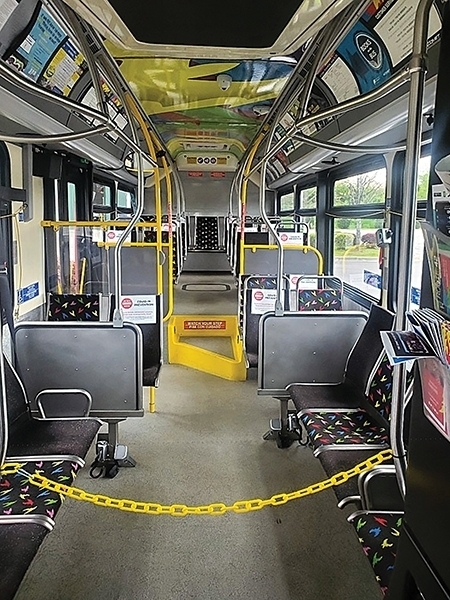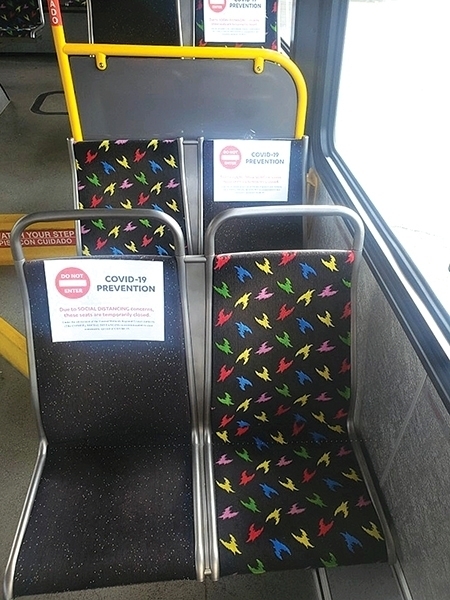
By Emma Green
Despite the continuation of a global pandemic, The Central Midlands Regional Transit Authority (The COMET) has worked to provide safe and reliable transit operation for its citizens throughout the COVID-19 crisis.

As a regional public transit service, The COMET normally offers 34 fixed routes and transports approximately 2.8 million passenger trips a year on a fleet of more than 80 buses, vans, and trolleys. However, with the rapid onset of a pandemic and the result in declining ridership, the public transit sector called for immediate responses in an increased effort to limit exposure for riders and essential workers.
“We started having internal meetings when COVID started becoming a big deal,” said The COMET’s Executive Director and CEO John Andoh. “We started to make the decision that once the state of emergency occurred, we were going to reduce the level of service, start promoting essential travel only, and enhance our cleaning efforts.”
The agency instituted hourly and daily disinfecting practices, reduced scheduled run times, and replaced smaller buses with larger 35-foot vehicles to accommodate social distancing measures. The COMET implemented fare-free transportation to ease the financial burden of riders who lost wages due to the pandemic.
Bus operators and staff were required to use multiple temperature-check stations upon reporting for their shift, and rear-door boarding became mandatory for all passengers except for seniors or those using wheelchairs.
The board quickly established a COVID-19 ad hoc committee to effectively guide staff on how to operate the system during the pandemic. The committee met weekly, discussing updates on changing legislation, executive orders, and any standards that are applicable toward ensuring safe passenger travel.
A daily COVID-19 call was also instituted, focusing on noteworthy trends, ridership levels and operational concerns, enabling a quick response to any impending issues.
“Those steps are what led us to where we are today, to the system that we have with our operational policy: wearing a mask,” Andoh said. “We actually adopted a mask policy before any of the other local governments did. We just proactively figured, if you needed a shirt or pants to ride a bus, then there was no reason why our board couldn’t adopt a policy which requires a mask to ride our buses.”
Bus operators were instructed not to drive unless all passengers complied with safety guidelines. In addition to the mandatory mask policy, drivers were also given face shields to further protect themselves and their passengers.
 The COMET worked quickly to develop an effective COVID-19 communications policy, utilizing billboards, newspaper, and radio advertisements to spread the word about current safety policies and procedures.
The COMET worked quickly to develop an effective COVID-19 communications policy, utilizing billboards, newspaper, and radio advertisements to spread the word about current safety policies and procedures.
“We did a community-wide campaign to let people know why we’re here, why we’re still running,” Andoh explained, “And that if you want to use us, we would rather you use us for essential travel only.”
Shortly after transportation services resumed, The COMET reopened its downtown transit hub, COMET Central, with capital upgrades and a mandatory mask requirement.
The COMET had been scheduled to upgrade COMET Central and the Columbia Place Mall SuperStop in the first quarter of 2020. When the pandemic hit, more adjustments had to be considered to ensure increased safety and security of the facilities. The COMET received funding through the CARES Act, which helped pay for safety and security upgrades for the two locations.
“The upgrades to these two locations are long overdue,” Andoh said. “There were many things needed in order to make access to The COMET services a pleasant experience for those needing to ride for essential travel.”
Improvements to COMET Central included painting and landscaping, and the installation of a security fence, ATM, and vending machines. Upgraded safety and security measures were also implemented including increased facility cleaning and sanitization, onsite police support, and additional security and janitorial staff.
Columbia Place Mall SuperStop consolidated four bus stops into one central location with the addition of six bus bays, three shelters, and an ADA-accessible ascension. New sidewalks, benches and updated lighting were also installed.
While The COMET’s board of directors have stopped meeting in person since the onset of the pandemic, members of the public are still welcome to attend virtual meetings while safely social distancing at the COMET’s boardroom. Virtual attendance is also a new option at these meetings.
“Transparency is the key, especially when you can’t physically go to a meeting,” Andoh said. “So, we started posting public meetings on our YouTube channel and Facebook Live so the community can still participate in government and decision-making – without feeling like governments are operating behind closed doors and in secrecy.”
